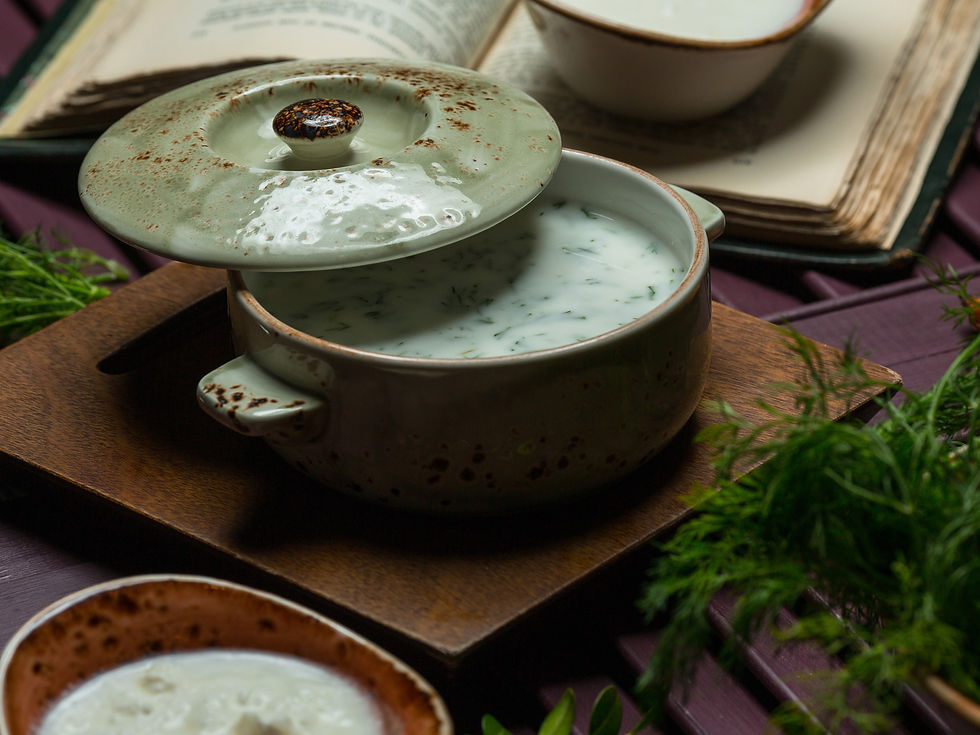How Hydration Affects Your Gut During a Soup Cleanse
- Kellen Day
- Jul 7
- 3 min read

Embarking on a soup cleanse journey can be a gentle and nourishing way to give your digestive system a break. But did you know that hydration affects your gut just as much as the ingredients you sip? In this post, we’ll explore why maintaining optimal fluid balance is vital for cleansing beginners, delve into the gut science behind water and digestion, and share practical hydration tips to keep you feeling light and supported throughout your cleanse.
Why Hydration Affects Your Gut
When you’re in a liquid‑only phase like a soup cleanse, you’re already boosting your fluid intake compared to solid‑food days. However, not all fluids are created equal, and total daily water balance still matters. Proper hydration:
Supports Mucosal Barrier Integrity. The inner lining of your intestines relies on a thin mucous layer to protect against pathogens and aid nutrient absorption. According to the National Institutes of Health, adequate water intake helps maintain this barrier, thereby reducing inflammation and the risk of “leaky gut.”
Promotes Regular Motility. Water softens stool, encouraging smooth transit through the digestive tract. Dehydration can slow motility, leading to discomfort, bloating, and constipation—issues you want to avoid when giving your gut a rest.
Enhances Nutrient Transport. Hydration facilitates the movement of water‑soluble vitamins (like B‑complex vitamins) from the intestinal lumen into your bloodstream, ensuring you reap the full benefits of nutrient‑rich broths and purees.
How to Gauge Your Hydration Needs
Every individual’s fluid requirements differ based on body size, activity level, climate, and the specific demands of a cleanse. As a general guideline:
Use Urine Color. Pale straw‑yellow generally indicates good hydration; darker hues suggest you need more fluids.
Monitor Thirst. While not perfect, thirst remains a useful barometer. Sip regularly rather than waiting for strong thirst signals.
Account for Electrolytes. Since soup cleansing often increases sodium and potassium intake via broths but may lack magnesium and calcium, consider hydrating with a pinch of sea salt and a squeeze of lemon, or enjoy a mineral‑rich herbal tea.
Best Hydration Practices During a Soup Cleanse
1. Sip Warm Broths Mindfully
Warm liquids can soothe the digestive tract and promote peristalsis (the wave‑like muscle contractions that move food). Aim for 4–6 cups of broth throughout the day, divided into smaller servings to prevent overeating.
2. Include Hydrating Herbal Teas
Caffeine-free options, such as peppermint, ginger, or chamomile, not only add variety but also deliver compounds that soothe the gut. For example, ginger tea may help reduce nausea and support motility.
3. Water Between Bowls
Balance the hydrating power of your soups by drinking plain water or infused water (such as cucumber, mint, or citrus slices) between meals to ensure you’re meeting your baseline fluid goal of approximately 2–3 liters per day.
4. Electrolyte‑Balanced Sips
Homemade electrolyte drinks—simply water with a dash of sea salt and a hint of natural sweetener—can help maintain sodium and potassium levels, which are essential for muscle function and nerve signaling in the gut.
Common Hydration Pitfalls to Avoid
Overdrinking at Once: Flooding your stomach with large volumes can dilute digestive enzymes, leading to discomfort.
Ignoring Electrolytes: Relying solely on plain water may deplete sodium and potassium, which can affect muscle contractions in the gut.
Neglecting Cooling Needs: In warmer climates or during exercise, you may need to drink extra water, even on cleanse days.
Wrapping Up: Optimize Your Cleanse with Smart Hydration
A successful soup cleansing experience hinges not only on which ingredients you choose but also on how you hydrate. Remember, hydration plays a crucial role in maintaining gut health by supporting mucosal integrity, promoting regular bowel movements, and facilitating efficient nutrient absorption. By sipping broth mindfully, alternating it with water and herbal teas, and balancing your electrolytes, you’ll keep your digestive system running smoothly, even as you give it a well-deserved break.










Comments